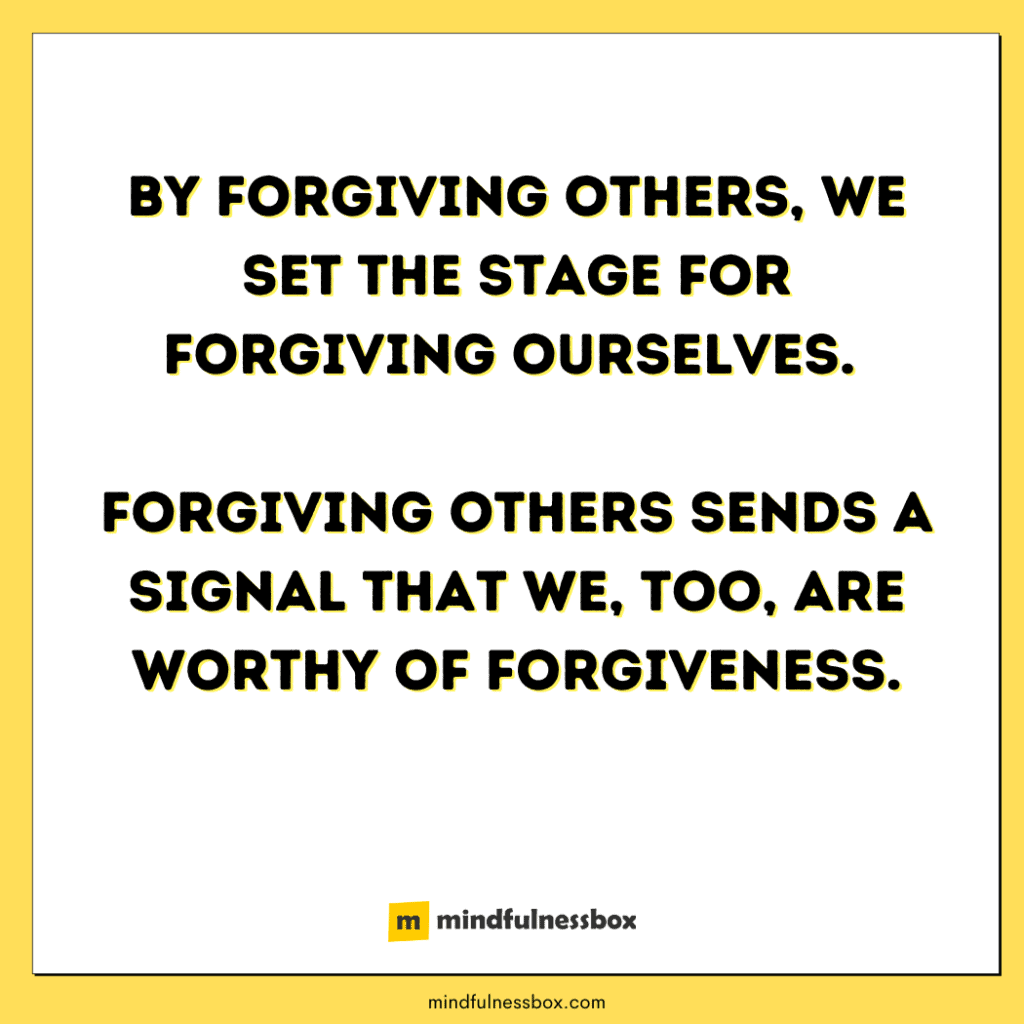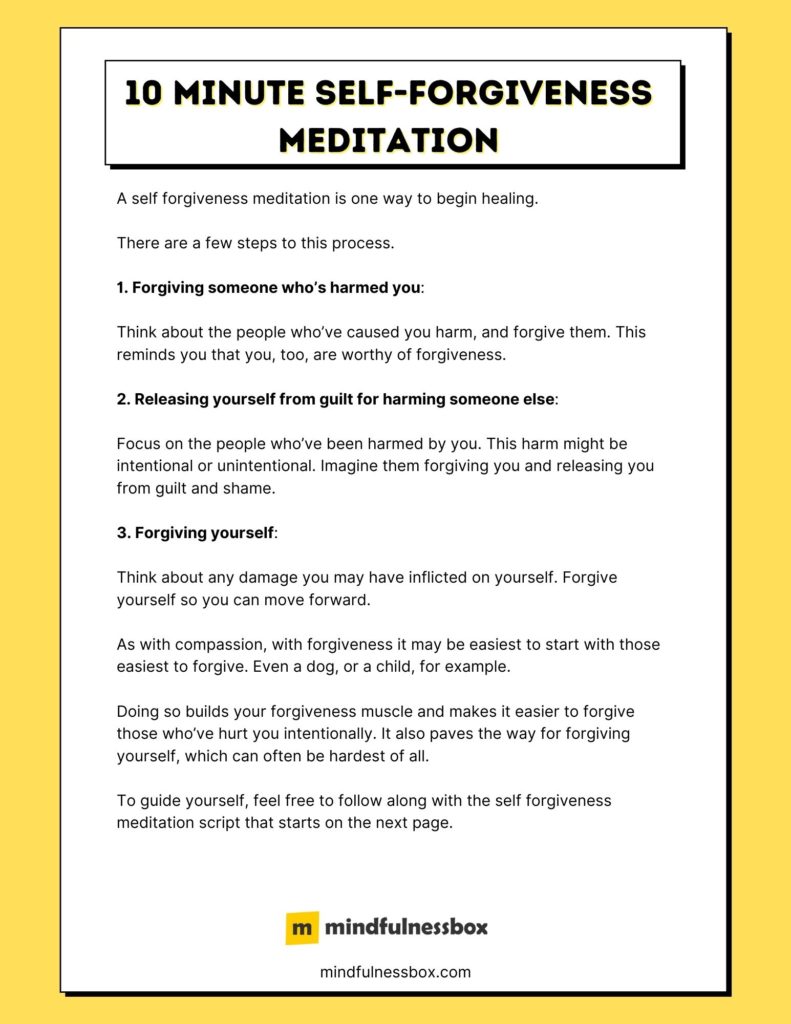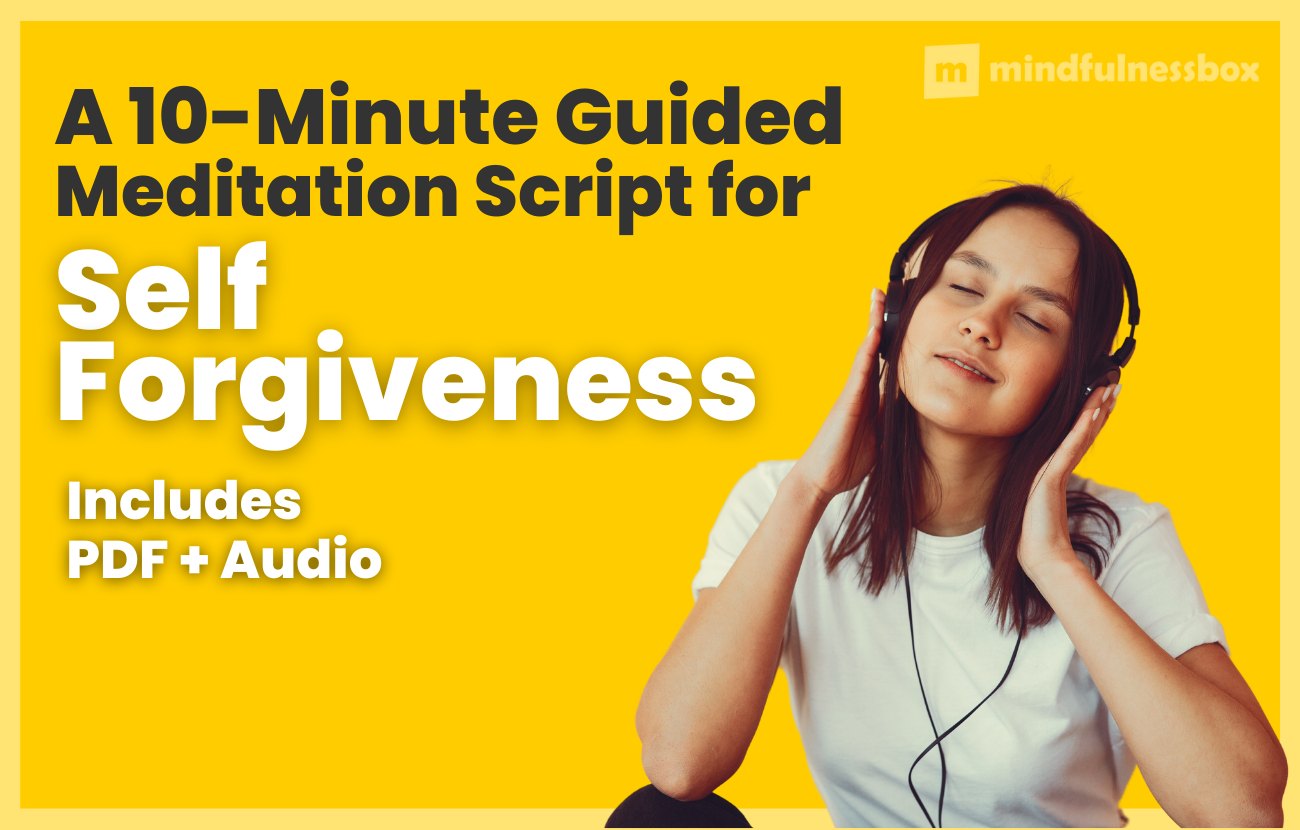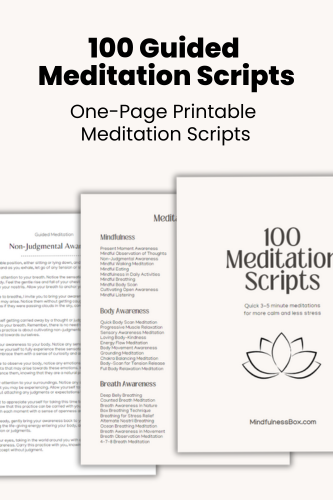Harming others, on purpose or not, comes with being human. That’s why having the capacity to forgive yourself is so important. This 10-minute forgiveness meditation script will help you make progress towards forgiving yourself.
As we go through this world, we make all kinds of mistakes. It happens every day.
These 100 meditation scripts were created to help beginner and intermediate meditators practice key mindfulness concepts like self-love, forgiveness, gratitude, and inner peace.
Designed to fit into busy schedules, each meditation script lasts 3-5 minutes. Perfect for starting or closing a group meditation; for yoga, coaching, or therapy sessions; or for your personal meditation practice.
We hurt people we love, we hurt friends, we hurt strangers. We hurt people consciously and unconsciously. We hurt people without even knowing. We project our moods and wounds and trauma onto others.
There’s no way to make it through life without hurting others.
It’s a part of being human.
But carrying all that around leads to guilt and shame. It makes us heavy. It limits the lightness and joy we can bring into the world.
That’s why having the capacity to forgive yourself is so important.
Meditation can help with healing

A self forgiveness meditation is one way to begin healing.
There are a few steps to this process.
- Forgiving someone who’s harmed you: Think about the people who’ve caused you harm, and forgive them. This reminds you that you, too, are worthy of forgiveness.
- Releasing yourself from guilt for harming someone else: Focus on the people who’ve been harmed by you. This harm might be intentional or unintentional. Imagine them forgiving you and releasing you from guilt and shame.
- Forgiving yourself: Think about any damage you may have inflicted on yourself. Forgive yourself so you can move forward.
As with compassion, it may be easiest to focus your forgiving meditation on those easiest to forgive, at least at the start: a dog or a child, for example.
Doing so builds your forgiveness muscle and makes it easier to forgive those who’ve hurt you intentionally. It also paves the way for forgiving yourself, which can often be hardest of all.
To guide yourself, try this self forgiveness meditation script.
Self-Forgiveness Meditation Script
If you’re looking for self forgiveness exercises, a guided meditation for forgiveness is one of the best approaches you can take. Feel free to follow along with this 10 minute guided meditation script.
A Self Forgiveness Meditation
Let’s begin with a guided self forgiveness meditation.
Forgiveness, like any meditation, is a practice. It can take time.
If it doesn’t feel right for you yet, don’t force it.
As emotions come up in the course of this meditation, do your best to acknowledge them nonjudgmentally. Treat your emotions like clouds passing by. Notice them, but let them pass.
Begin by settling into a seated position. Make sure you feel comfortable.
Now, focus on your breathing.
What does your breath feel like as it enters your nose, and exits your mouth?
Keep breathing.
Zoom out, noticing how your entire body feels.
Are you holding any tension? Notice how your shoulders, your back, and your jaw feel. For many people, those areas tend to hold tension. If so, invite yourself to release the tension.
Forgiving someone who’s harmed you
Now, think about someone who’s caused you harm, whether consciously or unconsciously. Remember, you are in control of this process. As you build your practice, you may want to start by choosing someone who is easy to forgive, like a child, or a dear friend. By forgiving others, we set the stage for forgiving ourselves. Forgiving others sends a signal that we, too, are worthy of forgiveness.
Stay focused on your breath as you bring this person to mind, nonjudgmentally noticing any thoughts, feelings, or sensations that may arise.
Visualize the person you intend to forgive, and tell them, “I forgive you. You don’t need to be burdened by this anymore. I release you.”
Pause, and return to your breath.
Take a deep breath in for five seconds. Then, release for ten seconds. And, repeat.
Releasing yourself from guilt for harming someone else
Now, bring to mind someone who you’ve harmed. Remember, you’re in control of this process. You may choose to identify a situation that is easier to let go of at first.
Imagine yourself standing in front of the person you’ve consciously or unconsciously harmed. Look in their eyes, and tell them you’re sorry. Ask for forgiveness.
Now, imagine the same scene. You’re standing in front of the person you’ve harmed. But instead of the “current” you, imagine it’s a younger version of yourself. You’re a child, standing in front of the person you’ve harmed, asking for forgiveness. Zoom out, and watch this scene from a distance. Notice if it feels easier or harder to forgive yourself in this way.
Just like children, we make mistakes. Just like children, we need to forgive ourselves so we can become the fullest version of ourselves, unburdened by guilt and shame.
Pause, and return to your breath.
Take a deep breath in for five seconds. Then, release for ten seconds. And, repeat.
Forgiving yourself
Now, bring yourself to mind. Remember that in the course of living our lives, we also hurt ourselves. We limit our potential, we damage ourselves, we hold onto guilt and shame for longer than we should.
Sometimes, we begin to blame, or even hate, past versions of ourselves for leading us down the road we’re on now.
But so much of what we do is based around our conditioning. So many of the ways we harm ourselves are unintentional.
Now imagine yourself as a child. Kneel down, and look the younger version of you in the eyes. Put your hands on his or her shoulders, and say: “I forgive you. It’s okay that you’ve hurt others. It’s okay that you’ve hurt yourself. It’s a part of being human. I release you.”
Pause, and return to your breath.
Take a deep breath in for five seconds. Then, release for ten seconds. And, repeat.
Take a moment to sit with your feelings, reflect, and release.
(pause)
When you are ready, gently open your eyes. Breathe deeply, returning to the present moment and to the rest of your day, knowing that you are allowed to feel peace, you are allowed to release difficult feelings, and that by healing yourself, you’re bringing more lightness and joy into the world.


My mindfulness practice kicked off in 2016 with a ten-day silent retreat. Since then, I’ve read dozens of books about mindfulness and completed hundreds of hours of meditation. Thinking about what makes humans happy, calm, and peaceful is endlessly fascinating to me.


